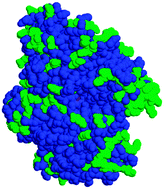Cold-adapted arsenite oxidase from a psychrotolerant Polaromonas species†
Abstract
Polaromonas sp. str. GM1 is an aerobic, psychrotolerant, heterotrophic member of the Betaproteobacteria and is the only isolate capable of oxidising arsenite at temperatures below 10 °C. Sequencing of the aio gene cluster in GM1 revealed the presence of the aioB and aioA genes, which encode the arsenite oxidase but the regulatory genes typically found upstream of aioB in other members of the Proteobacteria were absent. The GM1 Aio was purified to homogeneity and was found to be a heterodimer. The enzyme contained Mo and Fe as cofactors and had, using the artificial electron acceptor 2,6-dichlorophenolindophenol, a Km for arsenite of 111.70 ± 0.88 μM and a Vmax of 12.16 ± 0.30 U mg−1, which is the highest reported specific activity for any known Aio. The temperature-activity profiles of the arsenite oxidases from GM1 and the mesophilic betaproteobacterium Alcaligenes faecalis were compared and showed that the GM1 Aio was more active at low temperatures than that of A. faecalis. A homology model of the GM1 Aio was made using the X-ray crystal structure of the Aio from A. faecalis as the template. Structural changes that account for cold adaptation were identified and it was found that these resulted in increased enzyme flexibility and a reduction in the hydrophobicity of the core.

- This article is part of the themed collection: Microbial Metallomics

 Please wait while we load your content...
Please wait while we load your content...